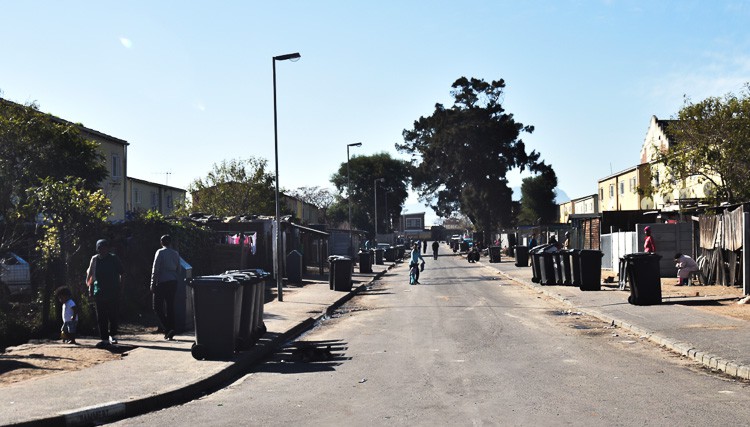
Council house tenants and backyarders in Bellville South want their overcrowded living conditions improved. Photo: Christine Hogg
25 August 2017
Walking through Bellville South in Cape Town, one sees rows and rows of council housing owned by the City of Cape Town, with Wendy houses, shacks and corrugated iron structures in most yards. Just “across the bridge”, as residents like to say, in areas like Glenhaven or Labiance, there are suburban homes fitted with burglar bars, and upmarket cars.
According to the City of Cape Town, there are 639 council rental flats in Bellville South. Overcrowding has been an issue for years and residents are demanding better living conditions.
Brothers Hilton and Patrick Salie (48 and 45) live in a corrugated iron “bungalow”, as they call it, in a backyard. The shack they lived in before burned down because, they say, having to depend on “neighbours’ kindness” for access to water, they weren’t able to put the fire out in time. They have been living here for about 10 years. Both are unemployed and Hilton recently had TB, which he blames on his living conditions. “I’m so scared that I’ll get it again, “ he says.
The City of Cape Town has started installing communal outdoor toilets (at least 1 per 5 households) as part of the Backyarder Programme, and the Salie brothers now have access to a shared toilet instead of using buckets as they did before.
Ursula Petersen, 54, lives in a one-room shack with her six children. When her mother’s rental house became overcrowded, she and her siblings started living in the backyard. Now there are nine “bungalows”, which until recently, shared one electricity meter and tap and used the house’s toilet. She complains about pipes blocking, and having to stop her son from playing in the sewerage.
The City has now installed a communal outdoor toilet, but Petersen says it’s dangerous to use at night, so they still use “the bucket system”. None of her neighbours are employed, and she says they can only afford to use electricity between 18:00 and 20:00, if at all. Petersen’s brother, Glenville Metcalf, 35, says they would be happy to live in the main part of Bellville where there is work, even in a Wendy house. But, he says, apart from at election time, “The government doesn’t help us. They’re leaving us to the lions.”
Kathy Scheepers, 51, is a clothing machinist who lives in a council house with her niece’s daughter and two children of her own. She is the only breadwinner, and has asthma, which is preventing her from going to work and providing for her family. She wants the council to renovate the house, which has cracks in the walls and an asbestos roof, and to give the tenants ownership.
On 4 May 2017, Scheepers and members of the Bellville South Housing Action Committee, consisting of tenants and backyarders, raised their concerns in a public meeting with Ward councillor Mercia Kleinsmith, but they say not much has come of it yet.
Kleinsmith said tenants did not have to wait for a public meeting to express their concerns; she has a ward office that is open five days a week.
Councillor Siyabulela Mamkeli, Mayoral Committee Member for Area Central, said the City was in the process of selling single residential units to tenants, on condition that all the tenants in the block of flats were in agreement with the sale.
She said renovation and maintenance of the rented units was subject to a priority system with emergencies, structural and health and safety issues, being dealt with first.
Mamkeli said the City was committed to providing sanitation, water, and electricity services directly to backyarders in City-owned rental units. This would take some time, but she urged backyarders in City-owned dwellings “to approach the City to request services as these services are installed on request and in cooperation with the residents involved.”
Currently, there are no plans for further affordable housing projects in Bellville South because, Kleinsmith says, there is no available public land. But, she said, residents could receive an opportunity to apply for affordable housing in other wards.